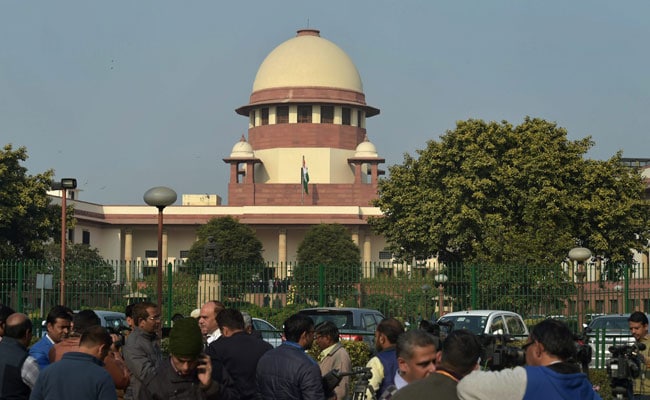
Third parties cannot intervene, observed the court, while hearing the Ayodhya land dispute case
New Delhi:
A verdict in the Ayodhya land dispute case that is being heard the Supreme Court could take longer. In a new twist to the case that involves 2.77 acres of land that Hindus and Muslims claim, the Supreme Court has first decided to examine the correctness of the five-judge bench verdict of 1994 which ruled that "mosque is not an essential and integral part of Islam and Muslims can offer prayers anywhere".
As hearing began today on a bunch of appeals against the Allahabad high court verdict that had ordered a three-way division of the disputed land, senior lawyer Rajeev Dhawan requested the Supreme Court to reconsider its 1994 verdict which took away the right of Muslims to offer namaaz at the disputed site.
In a 2:1 majority ruling, a three judge bench of the Allahabad high court had ordered in 2010 that the land be divided equally among the the Sunni Waqf Board, the Nirmohi Akhara and Ram Lalla.
In 1994, a constitution bench of the Supreme Court had directed that status quo on the Ram temple at Ayodhya be maintained so that Hindus can continue to offer prayers. The verdict also held that offering namaaz in a mosque is not an essential part of Islam.
Since this finding has prejudiced the high court decision and will affect the outcome of the title suit in the Supreme Court, the issue of offering prayers will have to be decided by a larger bench, said Mr Dhawan.
A three-judge bench comprising Chief Justice of India Justice Dipak Misra, and Justices Ashok Bhushan and S Abdul Nazeer asked Mr Dhawan to produce his arguments on March 23, the next date of hearing. The court would then decide whether to refer the 1994 verdict to another five judge bench.
During today's hearing, the court ruled out any third party intervention in the land dispute case.
"It is a land dispute. How can third parties intervene? No third party can intervene in a suit," the court observed.
The petitioners included 32 prominent citizens, including film director Shyam Benegal, columnist and writer Anil Dharkar, activist Teesta Setalvad and former union minister Arif Mohammad Khan.
As hearing began today on a bunch of appeals against the Allahabad high court verdict that had ordered a three-way division of the disputed land, senior lawyer Rajeev Dhawan requested the Supreme Court to reconsider its 1994 verdict which took away the right of Muslims to offer namaaz at the disputed site.
In a 2:1 majority ruling, a three judge bench of the Allahabad high court had ordered in 2010 that the land be divided equally among the the Sunni Waqf Board, the Nirmohi Akhara and Ram Lalla.
In 1994, a constitution bench of the Supreme Court had directed that status quo on the Ram temple at Ayodhya be maintained so that Hindus can continue to offer prayers. The verdict also held that offering namaaz in a mosque is not an essential part of Islam.
Since this finding has prejudiced the high court decision and will affect the outcome of the title suit in the Supreme Court, the issue of offering prayers will have to be decided by a larger bench, said Mr Dhawan.
A three-judge bench comprising Chief Justice of India Justice Dipak Misra, and Justices Ashok Bhushan and S Abdul Nazeer asked Mr Dhawan to produce his arguments on March 23, the next date of hearing. The court would then decide whether to refer the 1994 verdict to another five judge bench.
During today's hearing, the court ruled out any third party intervention in the land dispute case.
"It is a land dispute. How can third parties intervene? No third party can intervene in a suit," the court observed.
The petitioners included 32 prominent citizens, including film director Shyam Benegal, columnist and writer Anil Dharkar, activist Teesta Setalvad and former union minister Arif Mohammad Khan.
Track Latest News Live on NDTV.com and get news updates from India and around the world

